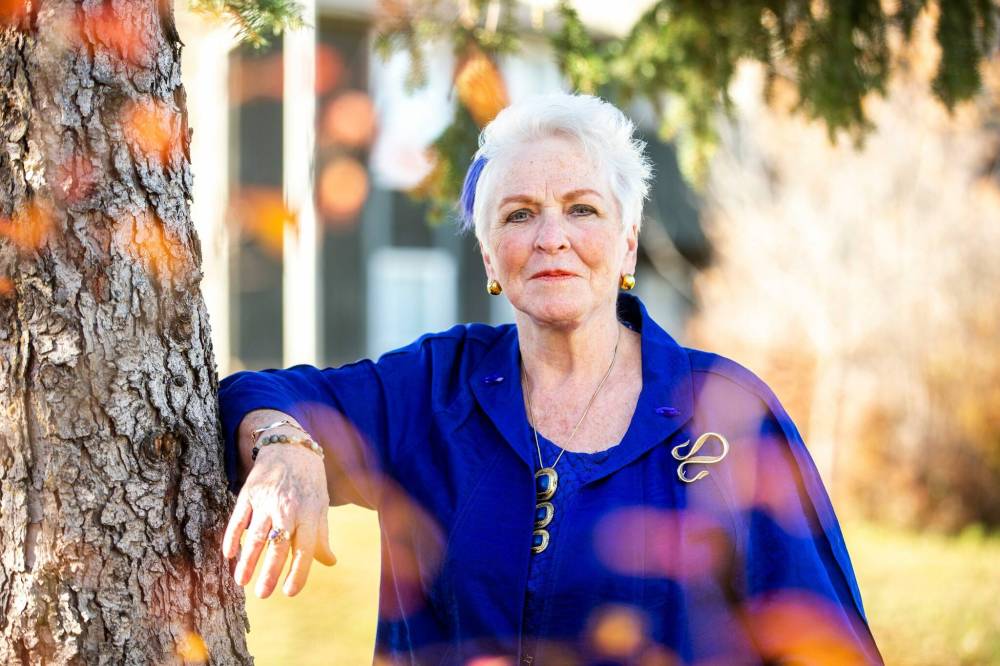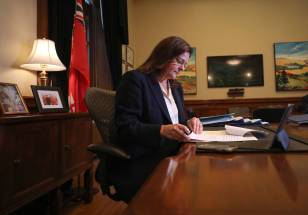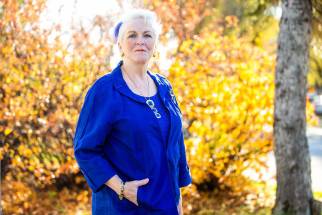The faces of inflation A senior, a student and a mother of four share their struggles with the rising cost of everything
Read this article for free:
or
Already have an account? Log in here »
To continue reading, please subscribe:
Monthly Digital Subscription
$0 for the first 4 weeks*
- Enjoy unlimited reading on winnipegfreepress.com
- Read the E-Edition, our digital replica newspaper
- Access News Break, our award-winning app
- Play interactive puzzles
*No charge for 4 weeks then price increases to the regular rate of $19.00 plus GST every four weeks. Offer available to new and qualified returning subscribers only. Cancel any time.
Monthly Digital Subscription
$4.75/week*
- Enjoy unlimited reading on winnipegfreepress.com
- Read the E-Edition, our digital replica newspaper
- Access News Break, our award-winning app
- Play interactive puzzles
*Billed as $19 plus GST every four weeks. Cancel any time.
To continue reading, please subscribe:
Add Free Press access to your Brandon Sun subscription for only an additional
$1 for the first 4 weeks*
*Your next subscription payment will increase by $1.00 and you will be charged $16.99 plus GST for four weeks. After four weeks, your payment will increase to $23.99 plus GST every four weeks.
Read unlimited articles for free today:
or
Already have an account? Log in here »
Hey there, time traveller!
This article was published 28/10/2022 (1135 days ago), so information in it may no longer be current.
A higher cost of living does not discriminate.
Everyone from seniors to students have adjusted and made sacrifices as they’ve watched the soaring costs of their day-to-day expenses.
Nearly half of Manitobans believe a recession is coming, according to a recent Dye & Durham survey conducted through the Angus Reid Forum. One-third of Manitobans delayed making a major purchase this year, and almost half plan to spend less this holiday season, the poll found.
The Free Press spoke to three Manitobans in different walks of life. All have changed their spending habits and outlooks for the future.
Lila Larson, 79
Lila Larson is updating her LinkedIn profile.
It’s better than Facebook, in terms of finding clients.
“I’m trying to think of how I can market myself again,” the 79-year-old said, adding she hasn’t changed her LinkedIn since the pandemic began.
Her resumé is long — executive coach, trainer, speaker, author. She’s self-employed. Her business stopped with the rest of the world, when lockdowns confined most Canadians to their homes.
MIKAELA MACKENZIE / WINNIPEG FREE PRESS Lila Larson is 79 and can’t retire, nor does she know when she’ll be able to. ‘I’ve become more aware of where every penny goes,’ she says.
It’s hard to discuss leadership issues with clients when kids are running around on the other side of a Zoom call, Larson noted.
But, in-person meetings and conferences have restarted. And despite being on the precipice of 80, Larson isn’t planning to stop working.
“I’ve become more aware of where every penny goes,” Larson said.
She’s on her own, in an apartment. Retirement isn’t an option.
“My pantry used to be quite full,” Larson said. “(Now) the pantry supply of canned goods and packaged goods has been dwindling.”
“When I think of myself and a possible recession… it’s my job to find a way to make it work, regardless of what’s happening in the economy.”–Lila Larson
She might opt for a tin of pork and beans instead of her usual Costco six-pack. Her van sees use three times a week, a shift from the pre-pandemic daily use, she said — she’s trying to save on fuel.
“I don’t intend to buy very much at all,” Larson said of the coming holiday season. “This year, my thought has been, ‘What could I make as a gift?’”
Cards, perhaps. She’ll wrap bundles of them with packages of chocolate.
Meantime, she’s looking to coach more entrepreneurs. She books appointments at lilalarsoninternational.com.
She encourages her mentees to pause and “figure out what you need to do in this moment to move yourself forward.”
“When I think of myself and a possible recession… it’s my job to find a way to make it work, regardless of what’s happening in the economy,” Larson said.
Keeping a close circle of friends helps, she added.
Pamela Hall, 52
Pamela Hall has a full house.
She, her husband, her four kids — ages 15 though 24 — and her cat are cozy in Oak Bluff.
The family will likely stay that way for a while. Two of the four graduated in 2020, from high school and Red River College Polytechnic, but they can’t afford to move out. They couldn’t get jobs in the first year of the pandemic, nor did they qualify for government aid.
“It’s the rent, the buying the food,” Hall, 52, said. “They are trying to get to the point where they make enough money to be able to live on their own, but they’re just not there yet.”
It could take another year or two of staying at home before they can comfortably leave, especially given inflation, Hall said.
“They are trying to get to the point where they make enough money to be able to live on their own, but they’re just not there yet.”–Pamela Hall
“It’s almost like a losing battle,” she said. “They’re trying to save, but they’re sort of never getting anywhere with it.”
Meanwhile, she’s hoping to retire from her job as an educational assistant by 60.
“The longer we have to support four children, the longer it’ll be before we can retire,” Hall said. “The higher the inflation goes, the more we need in our retirement savings, but the money we should be saving is still supporting our adult children.”
Savings have dropped, Hall noted. She’s buying cheaper cuts of meat and fewer snack foods. Spontaneous purchases on items like t-shirts aren’t happening.
Hall has a Christmas calculus: she’s prioritizing meals and family gatherings over gifts, meaning presents will be scaled back this year.
“I’d like to see (my kids) have full and independent lives, and that seems to be a struggle.”–Pamela Hall
“I feel like… the retirement of being able to travel and live comfortably is starting to be in question,” she said. “It’s looking more and more like we’re going to retire into a situation where we become homebodies.”
She said she loves having her family around — they’re really not a burden — and she made the choice to have four kids knowing her lifestyle would be different than parents with fewer children.
She worries about them more than herself and her husband.
“I think that we’ll be fine in the end; we’ll have what we need,” Hall said. “I’d like to see (my kids) have full and independent lives, and that seems to be a struggle… There doesn’t seem to be a whole lot of help out there for our young people.”
Rhianna Erickson, 23
Do we need to turn up the heat, or will another sweater work?
That might be a question Rhianna Erickson, 23, asks herself this winter.
Cost of living leads to streaming service cancellations for many
One-third of Canadians have cancelled their subscription with at least one streaming service over the last six months, according to an Angus Reid Institute poll released Thursday.
One-third of Canadians have cancelled their subscription with at least one streaming service over the last six months, according to an Angus Reid Institute poll released Thursday.
The shift comes amid subscription cost increases, potential advertisement introductions and platforms threatening to crack down on password sharing.
More than half of respondents who cancelled subscriptions attributed their decision to a higher cost of living.
Another 39 per cent said they weren’t using the services as much, while 24 per cent said selection wasn’t up to par.
Still, there are more users than in the past — 85 per cent of respondents said they subscribed to at least one platform, compared to roughly half in 2016.
The number of Canadians using cable or satellite TV has fallen, from 71 per cent in 2018 to 61 per cent now.
Landline use has also dropped, from 79 per cent in 2013 to 36 per cent in 2022.
Thirty-eight per cent of landline users said they’ll probably or definitely get rid of their phones in the future.
The Angus Reid Institute surveyed 1,618 Canadians online from Oct. 11 through 13. The poll would carry a margin of error of +/- two percentage points, 19 times out of 20, for comparison only.
— Gabrielle Piché
“Both me and my roommate are… afraid of what this December will look like,” the University of Manitoba student said.
Her landlord downtown is great, she added. The utility bills, not so much.
“I keep a pretty strict budget, especially since school started,” Erickson said.
It means no new clothes and few — if any — trips to the movie theatre. After all, once Erickson graduates with her education degree, her regular expenses will increase. She has student loans and wants a car.
“Honestly, I don’t really expect ever buying a house unless… I marry someone who makes a ton of money,” Erickson said.
She moved out with roommates at 18 years old. Rental living could be her lifelong reality, she said.
“The housing market just seems like… that’s not something I can think about,” Erickson said. “Those numbers are just crazy to me.”
She tutors, grades papers, coaches. Despite having a self-proclaimed “zero-sum” approach to spending, Erickson has eased her strictness on grocery shopping.
“Honestly, I don’t really expect ever buying a house.”–Rhianna Erickson
“Even cheap food is expensive,” she said. “I’m going to treat myself nicely by having nice food.”
So, vegan substitutes for butter and milk are within the budget.
Erickson plans to spend more on presents this holiday season because she’s making more money at work than she ever has.
The impacts of inflation and rising interest rates are “broad based,” said Martha Vallance, chief operating officer of Dye & Durham, which provides software to legal, financial and business professionals.
The company ran a survey on the impacts of interest rate hikes and worries of a recession. Dye & Durham deals with real estate lawyers and thought the data would be useful, Vallance said.
“It’s widely expected that economic growth is going to slow down, so (companies and professionals) need to make sure that they’re able to be profitable through this period,” Vallance said.
Forty-eight per cent of Manitoba respondents said they believe Canada will enter a recession soon. Thirty-seven per cent believe the country is already there.
Manitobans represented just 53 of the 1,515 people surveyed. However, the province’s data largely aligns with the national picture, Vallance said.
“You often see discretionary spends cut first.”–Martha Vallance
More than half of Manitobans — 58 per cent — declared they have less money to put into savings, and 49 per cent expect to spend less during the holidays.
“You often see discretionary spends cut first,” Vallance said. “Major expenditures will oftentimes get put under review, and that is exactly what’s coming across in this survey.”
One-third of Manitobans said they’ve delayed making a major purchase, like a home, this year; 19 per cent said it’ll take significantly longer than expected to pay off their mortgage.
The Bank of Canada raised its key interest rate to 3.75 per cent Wednesday. Manitoba’s inflation rate rose to 8.1 per cent in September, when comparing this year to last.
Canadians completed Dye & Durham’s online survey from Oct. 19 to 21 through the Angus Reid Forum. The margin of error would be plus or minus 2.5 percentage points, 19 times out of 20, for comparison purposes.
gabrielle.piche@winnipegfreepress.com

Gabby is a big fan of people, writing and learning. She graduated from Red River College’s Creative Communications program in the spring of 2020.
Our newsroom depends on a growing audience of readers to power our journalism. If you are not a paid reader, please consider becoming a subscriber.
Our newsroom depends on its audience of readers to power our journalism. Thank you for your support.









